|
|
|
Sort Order |
|
|
|
Items / Page
|
|
|
|
|
|
|
| Srl | Item |
| 1 |
ID:
126641


|
|
|
|
|
| Publication |
2013.
|
| Summary/Abstract |
Gulf Cooperation Council countries are seeking to develop their governmental financial information systems to make them more informative and transparent. The aim of this article is to determine the extent to which Qatar has developed its governmental financial information systems in response to the enormous degree of economic and administrative development in recent decades, and to identify the most important factors that have influenced the reforms made in this area. For this purpose, Lüder's Financial Management Reform Process Model (2001) was referred to and semi-structured interviews were carried out with governmental accounting officials in Qatar in June 2011.
|
|
|
|
|
|
|
|
|
|
|
|
|
|
|
|
| 2 |
ID:
087033
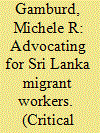

|
|
|
|
|
| Publication |
2009.
|
| Summary/Abstract |
Nearly a million Sri Lankan women labor overseas as migrant workers, the vast majority in the Gulf Cooperation Council (GCC) countries in West Asia. They are poorly paid and vulnerable to a wide variety of exploitative labor practices at home and abroad. Despite the importance of worker remittances to Sri Lanka's national economy, and in spite of the nation's history of organized labor and active political participation, migrants have received only anemic support from the state, labor unions, feminist organizations, and migrant-oriented nongovernmental organizations. The article contextualizes Sri Lankan migration within larger-scale economic dynamics (such as global capitalist policies and processes) and local-level ideological formations (such as local political histories and culturally shaped gender norms). The author argues that political freedoms in destination countries have a significant effect on organizing activities in both host and sending nations. Comparing the Sri Lankan and Philippine situations, the author contends that the vibrant activism in the Philippines correlates with the liberal organizing climates in the European Union and in East and Southeast Asia, while the paucity of organizing in Sri Lanka correlates with the strict repression of guest workers in the GCC. Compared to other destinations, the GCC countries give workers (particularly women) less chance for autonomous activities, are less open to labor organizing, and are less responsive to political protest.
|
|
|
|
|
|
|
|
|
|
|
|
|
|
|
|
| 3 |
ID:
083405
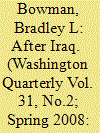

|
|
|
|
|
| Publication |
2008.
|
| Summary/Abstract |
As forces are withdrawn from Iraq, the United States should resist the temptation to increase or redeploy troops to the Gulf Cooperation Council (GCC) states. The United States can deter Iran and reassure its GCC allies by other means without expanding military bases
|
|
|
|
|
|
|
|
|
|
|
|
|
|
|
|
| 4 |
ID:
110161
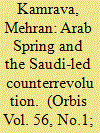

|
|
|
|
|
| Publication |
2012.
|
| Summary/Abstract |
The author contends that the Arab Spring has provided an opening for the Gulf Cooperation Council as a group and for Saudi Arabia as a long-time aspiring leader of the Arab world to try to expand their regional influence and global profile. An already weakened Arab state system, he argues, has been once again weakened by the sweeping wave of rebellion.
With its final chapter yet to be written, the Arab Spring of 2011 is likely to go down in history as a season of profound political changes that swept across the domestic politics of the Arab world. Even at this preliminary stage, that much is clear. What remains unclear, however, is how political change sweeping across the Middle East and North Africa is likely to alter the international relations of the Arab world in general and, in particular, the larger regional position and specific policy preferences of the Gulf Cooperation Council (GCC). Important considerations include the GCC's posture and profile vis-à-vis the Arab Spring, its collective reaction to the region-wide movements for political change, and its delicate relationship with its two troubled neighbors to the north, namely Iran and Iraq.
While the Arab Spring is unlikely to result in meaningful changes in Iran and Iraq's relationships with the GCC, it has fostered two discernible trends in the larger Arab world. First, Saudi Arabia has sought to reassert its position of prominence and leadership within the GCC. In fact, the kingdom has positioned itself as the chief architect of a counterrevolution to contain, and perhaps to even reverse, the Arab Spring as much as possible. Second, and an outgrowth of the first development, is the GCC's attempt to solidify its identity and mandate through the inclusion of additional Sunni monarchies-Morocco and Jordan-as a counterbalance, if not a substitute, to the Arab League.
|
|
|
|
|
|
|
|
|
|
|
|
|
|
|
|
| 5 |
ID:
058081
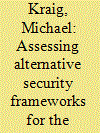

|
|
|
| 6 |
ID:
111228
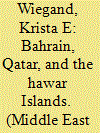

|
|
|
|
|
| Publication |
2012.
|
| Summary/Abstract |
The Hawar Islands dispute, resolved in 2001, is the only territorial dispute between two Arab states that has been resolved by the International Court of Justice (ICJ). Several factors played a role in influencing Qatar and Bahrain to resolve their dispute at the ICJ: 1) the inability of Arab states and the Gulf Cooperation Council (GCC) to mediate the dispute, 2) incentives for significant oil and natural gas reserves, and 3) incentives for bilateral and regional cooperation on salient issues between the two states. Both states have benefited significantly since the resolution of the dispute.
|
|
|
|
|
|
|
|
|
|
|
|
|
|
|
|
| 7 |
ID:
083792
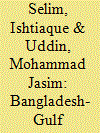

|
|
|
|
|
| Publication |
2008.
|
| Summary/Abstract |
The economic relations between Bangladesh and the oil rich Gulf Cooperation Council (GCC) countries are important for a developing nation like Bangladesh for a number of reasons. The countries of the Gulf, which are considered as one of the fastest growing economic blocs, remain the important sources of crude oil, remittances and overseas employment opportunities for Bangladesh and thus contribute significantly towards its economic development. Also, the Gulf nations have been assisting Bangladesh generously in various activities with aid and grants. In this backdrop, the current article will make an effort to assess Bangladesh's economic relations with the GCC countries. In the process of analysis, the article will look into trends and levels of remittances earned by Bangladesh from the Gulf nations. It will also focus on the current status of Bangladesh-GCC trade relations. Finally, this article will identify some challenges and prospects involved with the Bangladesh-GCC economic relationship.
|
|
|
|
|
|
|
|
|
|
|
|
|
|
|
|
| 8 |
ID:
141551


|
|
|
|
|
| Summary/Abstract |
The events of the past five years have put an intense strain [1] on the relationship between the United States and its traditional partners in the Arab world, particularly the countries that belong to the Gulf Cooperation Council: Bahrain, Kuwait, Oman, Qatar, Saudi Arabia, and the United Arab Emirates. As popular revolts have flared up across the Middle East, civil wars have broken out, and the regional order has become increasingly vulnerable, leaders in Washington and in Arab capitals have often had starkly different reactions. Meanwhile, most of the GCC countries have watched nervously—and sometimes angrily [2]—as the United States has negotiated with their bitter rival, Iran, over an agreement to limit the Iranian nuclear program.
|
|
|
|
|
|
|
|
|
|
|
|
|
|
|
|
| 9 |
ID:
001065
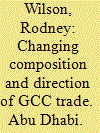

|
|
|
|
|
| Publication |
Emirates Centre for Strategic Studies and Research, 1998.
|
| Description |
50p.
|
| Series |
Emirates Occasional paper; no.18
|
|
|
|
|
|
|
|
|
|
|
|
Copies: C:1/I:0,R:0,Q:0
Circulation
| Accession# | Call# | Current Location | Status | Policy | Location |
| 040565 | 341.2477/WIL 040565 | Main | On Shelf | General | |
|
|
|
|
| 10 |
ID:
172442
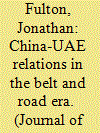

|
|
|
|
|
| Summary/Abstract |
In the summer of 2018 China and the United Arab Emirates (UAE) upgraded their bilateral relationship to a comprehensive strategic partnership, China’s highest level of diplomatic relations. This follows a trajectory of deepening multifaceted ties that has been steadily becoming strategically important for both states, especially as China’s Belt and Road Initiative (BRI), launched in 2013, results in deeper engagement in the Middle East. This article examines the features of the China-UAE relationship, providing an original historical framework that explains the context of relations through four periods prior to the BRI: indifference, hostility, transition, and interdependence. It then analyzes developments in the bilateral relationship during the early stages of the BRI, demonstrating that the UAE has become a key partner for China in its Middle East policy.
|
|
|
|
|
|
|
|
|
|
|
|
|
|
|
|
| 11 |
ID:
075455
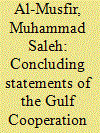

|
|
|
| 12 |
ID:
068291
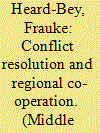

|
|
|
| 13 |
ID:
189178
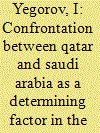

|
|
|
|
|
| Summary/Abstract |
THE PARADIGM of international relations in the Persian Gulf in the 20th century was determined by the interests of major players: the US, Great Britain, the USSR, etc. At the same time, relations between the oil-producing monarchies of the region, for all their complexity and ambiguity, remained in the background. After the creation of the Gulf Cooperation Council (GCC) in the early 1980s, opportunities emerged for a serious integration process that could lead to the creation of a single economic space with a single currency and common governance structures. However, for a number of reasons - among which we will identify economic ones (similarity in export structure), dynastic ones (ambitions of the ruling families), and geopolitical ones (the desire of the US as the world hegemon to rule according to the "divide and rule" policy known since antiquity) - centripetal trends have given way to centrifugal ones. Moreover, the second decade of the 21st century as a whole was marked by the gradual departure of the main global player, the US, from the traditional doctrine of firm control to using "controlled chaos" tools to give regional players the opportunity to realize their own political ambitions, while the US mainly focused on protecting its key military, political, and economic interests.
|
|
|
|
|
|
|
|
|
|
|
|
|
|
|
|
| 14 |
ID:
007619
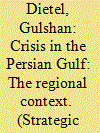

|
|
|
|
|
| Publication |
Jan 1995.
|
| Description |
1295-1270
|
|
|
|
|
|
|
|
|
|
|
|
|
|
|
|
| 15 |
ID:
188802
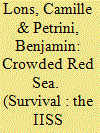

|
|
|
|
|
| Summary/Abstract |
It is unsurprising that the Red Sea region has come into sharper strategic focus for great powers as well as regional powers, given that 12% of global seaborne trade, 40% of Europe’s trade with Asia and the Middle East, and 8% of seaborne hydrocarbons pass through the Red Sea. Yet the region is chronically underdeveloped and conflict-ridden. Overlapping rivalries involving Iran, Israel and the Gulf Cooperation Council countries pose risks of intensifying regional discord. The United States has prioritised empowering its regional partners and strengthening emerging Israel–Gulf security synergies to counteract Iran’s activities and check China, which has become a key economic actor in the region and opened its first overseas military base, in Djibouti, in 2017. Given the potential divergence between American and regional concerns, however, neither US nor regional involvement appears likely to stabilise the region.
|
|
|
|
|
|
|
|
|
|
|
|
|
|
|
|
| 16 |
ID:
123326
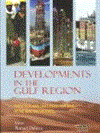

|
|
|
|
|
| Publication |
New Delhi, IDSA, 2014.
|
| Description |
xxxi, 177p.Hbk
|
| Standard Number |
9788182747456
|
|
|
|
|
|
|
|
|
|
|
|
Copies: C:2/I:0,R:0,Q:0
Circulation
| Accession# | Call# | Current Location | Status | Policy | Location |
| 057415 | 338.954053/DAH 057415 | Main | On Shelf | General | |
| 057416 | 338.954053/DAH 057416 | Main | On Shelf | General | |
|
|
|
|
| 17 |
ID:
048708
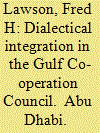

|
|
|
|
|
| Publication |
Abu Dhabi, Emirates Cemter for Stategic Studies and Research, 1997.
|
| Description |
52p.
|
| Series |
Emirates Occasional Papers; no. 10
|
|
|
|
|
|
|
|
|
|
|
|
Copies: C:2/I:0,R:0,Q:0
Circulation
| Accession# | Call# | Current Location | Status | Policy | Location |
| 039332 | 341.2477/LAW 039332 | Main | On Shelf | General | |
| 040499 | 341.2477/LAW 040499 | Main | On Shelf | General | |
|
|
|
|
| 18 |
ID:
082486
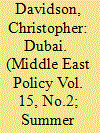

|
|
|
| 19 |
ID:
078467


|
|
|
| 20 |
ID:
074577
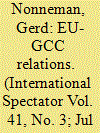

|
|
|
|
|
| Publication |
2006.
|
| Summary/Abstract |
The emergence of a bloc-to-bloc EU-GCC relationship is constrained by the divergent economic and political interests and foreign policy roles of the member states on both sides; the structural limitations of both organisations; the absence of a "champion" within the EU for collective relations with the GCC; the nature of the Gulf leaders' diplomacy; and the role of the US. From the GCC side, relations with Europe are shaped by a view of the latter as a key market and source of imports, and a means of diversifying the GCC states' economic and security resources. From the European side, the relationship has been moulded by the EU-wide interest in a stable Gulf region both for the security of world energy supplies, and the GCC states' potential contribution to stabilising the rest of the region; pre-existing relationships with particular member states; diverse perceptions of the relationship to the US and US policy; and varying levels of bilateral economic interest. The EU's ostensible pursuit of political reform and good governance is constrained by its own limited ability to develop a common policy on the matter, and limited leverage over the GCC states.
|
|
|
|
|
|
|
|
|
|
|
|
|
|
|
|
|
|
|
|
|